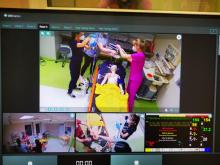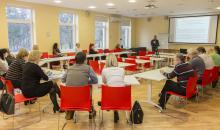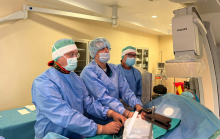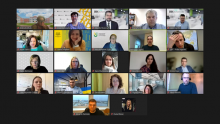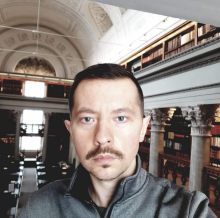The German Academic Exchange Service (DAAD), the Estonian National Agency for Erasmus+, and the European Solidarity Corps organised an international conference on the role of internationalisation in education and science on 25 March with the support of the Federal Ministry of Education and Research of Germany. The aim of the conference was to discuss innovative internationalisation trends in Germany, the Baltic States, and the Nordic countries.
Madara Blumberga, the Simulation-Based Education Development Manager in Nursing at the Rīga Stradiņš University (RSU) Medical Education Technology Centre (METC), carried out telesimulation demonstrations for their peers from the Jacobi Medical Centre’s (NY, USA) together with her colleagues Ligija Vucāne, Marta Gaidele and Ieva Zariņa.
Rīga Stradiņš University is recruiting a visiting lecturer within the framework of Project Applications Selection Round of Specific Aid Objective 8.2.2 “To Strengthen Academic Staff of Higher Education Institutions in the Areas of Strategic Specialisation”, project No 8.2.2.0/18/A/013 “Capacity Building of Rīga Stradiņš University Academic Staff”
On 1 April, Oscar Baldomero, curator of the anatomical collection of Professor Arthur von Hochstetter (1918–1997), and Professor Aigars Pētersons, Rīga Stradiņš University (RSU) Rector, signed a gift agreement in Basel, Switzerland. The agreement outlines transferring several unique 17th-20th century anatomical specimens to the RSU Anatomy Museum.
For the first time in Latvia, Pauls Stradiņš Clinical University Hospital (PSCUH) used a new minimally invasive method, balloon pulmonary angioplasty, to treat patients with thromboembolic form of pulmonary hypertension on 1 April this year.
To strengthen digitisation, innovation, and internal governance processes at Latvian universities, 17 Latvian education leaders and representatives from companies related to promoting education will participate in a Massachusetts Institute of Technology (MIT) international training programme with the financial support of the European Regional Development Fund. Among them are three Rīga Stradiņš University (RSU) employees:
On 24 and 25 March, Rīga Stradiņš University’s (RSU) 8th International Student Conference brought together more than 2,000 young science enthusiasts. The conference took place in a hybrid format this year: participants presented their research to local and international jury members on Zoom, while various workshops and masterclasses took place in person.
Viktors Pupiks is the man behind the scenes. He is one of the people who has the responsible task of ensuring that listeners of Latvijas Radio receive the most up-to-date information twice a day. He gives the impression of being a serious and very honest man.
On March 1st 2022, the Latvian Government approved the Latvian Open Science Strategy 2021-2027. The strategy aims to provide society, researchers, businesses, policymakers, and other stakeholders with freely accessible scientific information (including scientific publications and research data) and promote meaningful societal engagement in the scientific research process.
The Open Science Strategy is structured around three pillars:
The outcome of crises is largely determined by how people respond. Collective behaviour, judgement, and decision-making, particularly regarding medical matters, are at the core of Professor Wolfgang Gaissmaier’s research interests. The results of his research can be found in leading psychology and medicine journals.

